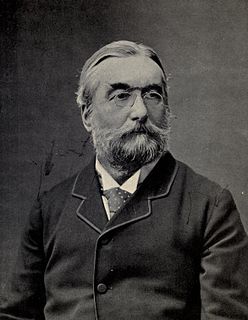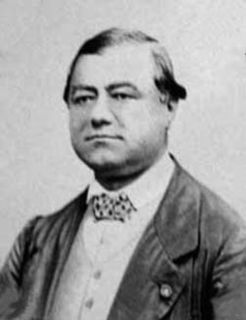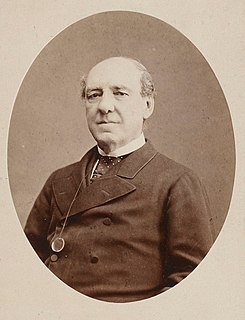Related Research Articles

Sir Joseph Norman Lockyer was an English scientist and astronomer. Along with the French scientist Pierre Janssen, he is credited with discovering the gas helium. Lockyer also is remembered for being the founder and first editor of the influential journal Nature.

Charles-Eugène Delaunay was a French astronomer and mathematician. His lunar motion studies were important in advancing both the theory of planetary motion and mathematics.

The Royal Society of Edinburgh is Scotland's national academy of science and letters. It is a registered charity that operates on a wholly independent and nonpartisan basis and provides public benefit throughout Scotland. It was established in 1783. As of 2021, there are around 1,600 Fellows.

Sir Charles Wyville Thomson was a Scottish natural historian and marine zoologist. He served as the chief scientist on the Challenger expedition; his work there revolutionised oceanography and led to his knighthood.

Thomas Thomson MD was a Scottish chemist and mineralogist whose writings contributed to the early spread of Dalton's atomic theory. His scientific accomplishments include the invention of the saccharometer and he gave silicon its current name. He served as president of the Philosophical Society of Glasgow.

Alphonse Louis Pierre Pyramusde Candolle was a French-Swiss botanist, the son of the Swiss botanist Augustin Pyramus de Candolle.

The Michael Faraday Medal and Prize is a gold medal awarded annually by the Institute of Physics in experimental physics. The award is made "for outstanding and sustained contributions to experimental physics." The medal is accompanied by a prize of £1000 and a certificate.

Sir William Abbott Herdman FRS FRSE FLS was a Scottish marine zoologist and oceanographer.

William Sharpey FRS FRSE LLD was a Scottish anatomist and physiologist. Sharpey became the outstanding exponent of experimental biology and is described as the "father of British physiology".

George Carey Foster FRS was a chemist and physicist, born at Sabden in Lancashire. He was Professor of Physics at University College London, and served as the first Principal from 1900 to 1904. The Carey Foster bridge is named after him.
The Botanical Society of Scotland (BSS) is the national learned society for botanists of Scotland. The Society's aims are to advance knowledge and appreciation of flowering and cryptogamic plants, algae and fungi. The Society's activities include lectures, symposia, field excursions, field projects and an annual Scottish Botanist's Conference, held jointly with the Botanical Society of Britain and Ireland for exchange of information between botanists working in different areas. Its publications include a twice-yearly newsletter, BSS News, and a scientific journal, Plant Ecology & Diversity. The society is closely linked to the Royal Botanic Garden Edinburgh and the Scottish universities.
Richard Émile Augustin de Candolle was a Swiss botanist and was British consul to the Canton of Geneva between 1912 and 1918.

Sir Henry Edward Landor Thuillier was Surveyor General of India. Under his direction, 796,928 square miles of India were surveyed, including difficult mountainous, forest, and desert regions, often for the first time. He was responsible for the printing in 1854 of the first postage stamps valid throughout India. Thuillier was elected a fellow of the Royal Society in 1869, made a CSI in May 1870, and knighted in June 1879.
Lt Colonel Frank Wyville Thomson FRSE IMS was a 19th/20th century Scottish military surgeon and expert on tropical medicine who advanced public health in India and a noted amateur naturalist.
References
- ↑ "Fellows of the Royal Society". London: Royal Society. Archived from the original on 16 March 2015.
- ↑ "Obituary Notices of Fellows Deceased: Editing Carey Foster". Proceedings of the Royal Society of London. 96 (680): i–xviii. 1920. Bibcode:1920RSPSA..96D...1.. doi: 10.1098/rspa.1920.0007 . JSTOR 93812.
- ↑ Cortie, A. L. (1921). "Sir Norman Lockyer, 1836–1920". Astrophysical Journal. 53: 233–248. Bibcode:1921ApJ....53..233C. doi:10.1086/142602.
- ↑ . Dictionary of National Biography . London: Smith, Elder & Co. 1885–1900.
- ↑ "Henry Thuillier". The Oxford Dictionary of National Biography. 2004. doi:10.1093/ref:odnb/36519.
- ↑ Fancher, R. E. (October 1983). "Alphonse de Candolle, Francis Galton, and the early history of the nature–nurture controversy". Journal of the History of the Behavioral Sciences. 19 (4): 341–352. doi:10.1002/1520-6696(198310)19:4<341::aid-jhbs2300190403>3.0.co;2-7. PMID 11608560.
- ↑ O'Connor, John J.; Robertson, Edmund F., "Charles-Eugène Delaunay", MacTutor History of Mathematics archive , University of St Andrews